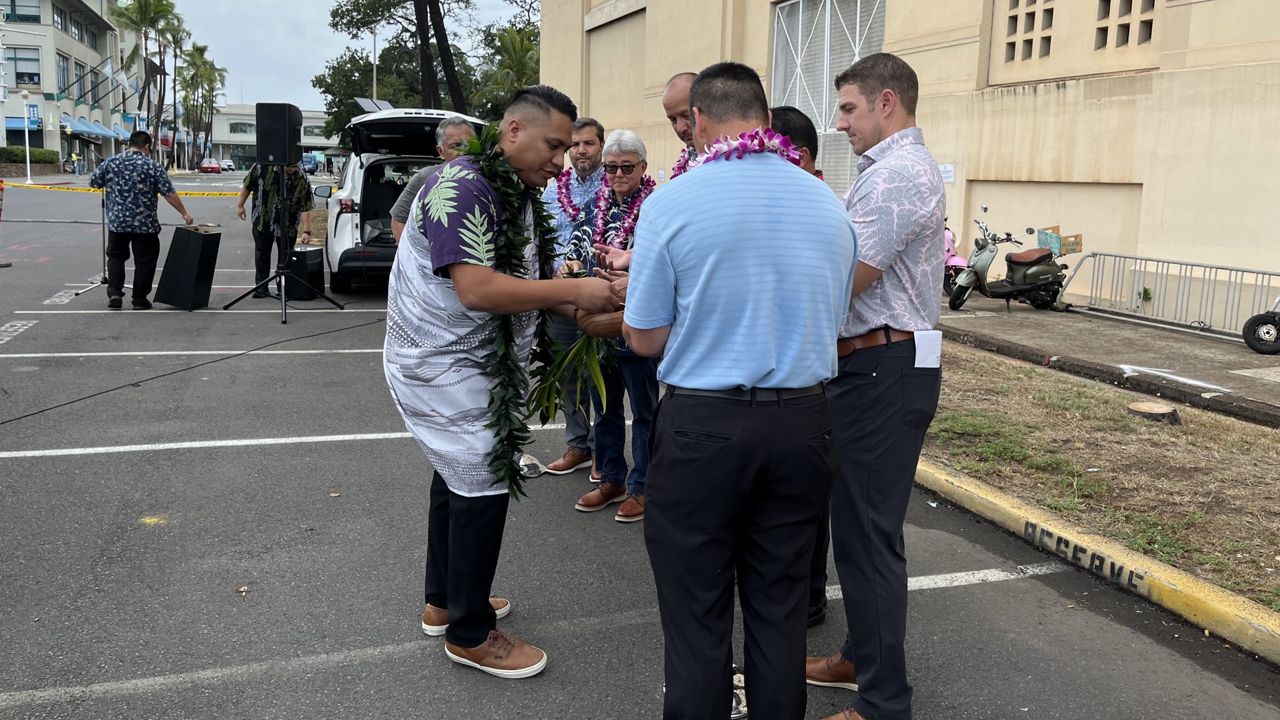HONOLULU — Federal and state officials joined private partners at Aloha Tower on Monday to mark the start of construction for a new electric vehicle charging station funded by the National Electric Vehicle Infrastructure (NEVI) program.
“Availability of charging infrastructure is a critical component to increasing adoption of electric vehicles, which in turn gets us closer to the state’s goal of achieving 100% clean energy by 2045,” said Hawaii Department of Transportation director Ed Sniffen. “As we break ground on the second NEVI station in Hawaii, we look forward to seeing fewer gasoline-only vehicles on the road and continuing to build our partnerships in electrification of transportation.”
The $2.5 million facility, the second NEVI-funded station in the state, will include four 150-kilowatt, direct current chargers and will be situated on Aloha Tower Drive fronting Pier 7.
The station is expected to be finished by November. Parking in front of Pier 7 will be closed during the work but Biki Station No. 109 will remain open, according to the state Department of Transportation.
The four 150 kW DC fast chargers have a Combined Charging System and CHArge de MOve (CHAdeMO) ports.
The first NEVI-funded electric vehicle charging station opened on Feb. 28 at the Kahului Park & Ride on Maui. To date, there have been more than 5,000 charging sessions at the station, which translates to a reduction of nearly 30,000 kilograms of carbon dioxide equivalent emitted into the atmosphere, according to HDOT. The amount of greenhouse gasses reduced by this charging is equivalent to the amount that would be sequestered by 2,500 fully grown trees.
“Hawaii continues to lead the way in building out convenient, reliable fast-charging infrastructure to serve residents and visitors alike,” said Gabe Klein, executive director of the Joint Office of Energy and Transportation. “We congratulate HDOT’s rapid progress and ongoing collaboration with the Joint Office to help other island communities, like Puerto Rico, create a future where everyone can ride and drive electric.”
Charging rates will be $0.44 per kWh from 9 a.m. to 5 p.m. and $0.57 per kWh from 5 p.m. to 9 a.m., the same as those on Maui. The rates are lower during the day as the cost of electricity goes down when more solar power is generated.
The NEVI program seeks to accelerate the adoption of EVs, reduce greenhouse gas emissions, help the U.S. lead global transportation electrification efforts and build out alternative fuel corridors through construction of a national network of electric vehicle chargers.
“I congratulate Hawaii on its second EV charging station in the state using federal investments from the Bipartisan Infrastructure Law,” said federal highway administrator Shailen Bhatt. “These stations will join our national EV charging network to bring more charging stations to communities all along America’s highways, create well-paid jobs in every community, and make EV charging as easy and convenient as filling up a gas tank.”
The NEVI program was authorized under the Bipartisan Infrastructure Law, which provides $1.2 trillion for transportation and infrastructure spending nationwide with $550 billion toward new investments and programs.
Michael Tsai covers local and state politics for Spectrum News Hawaii. He can be reached at michael.tsai@charter.com.



